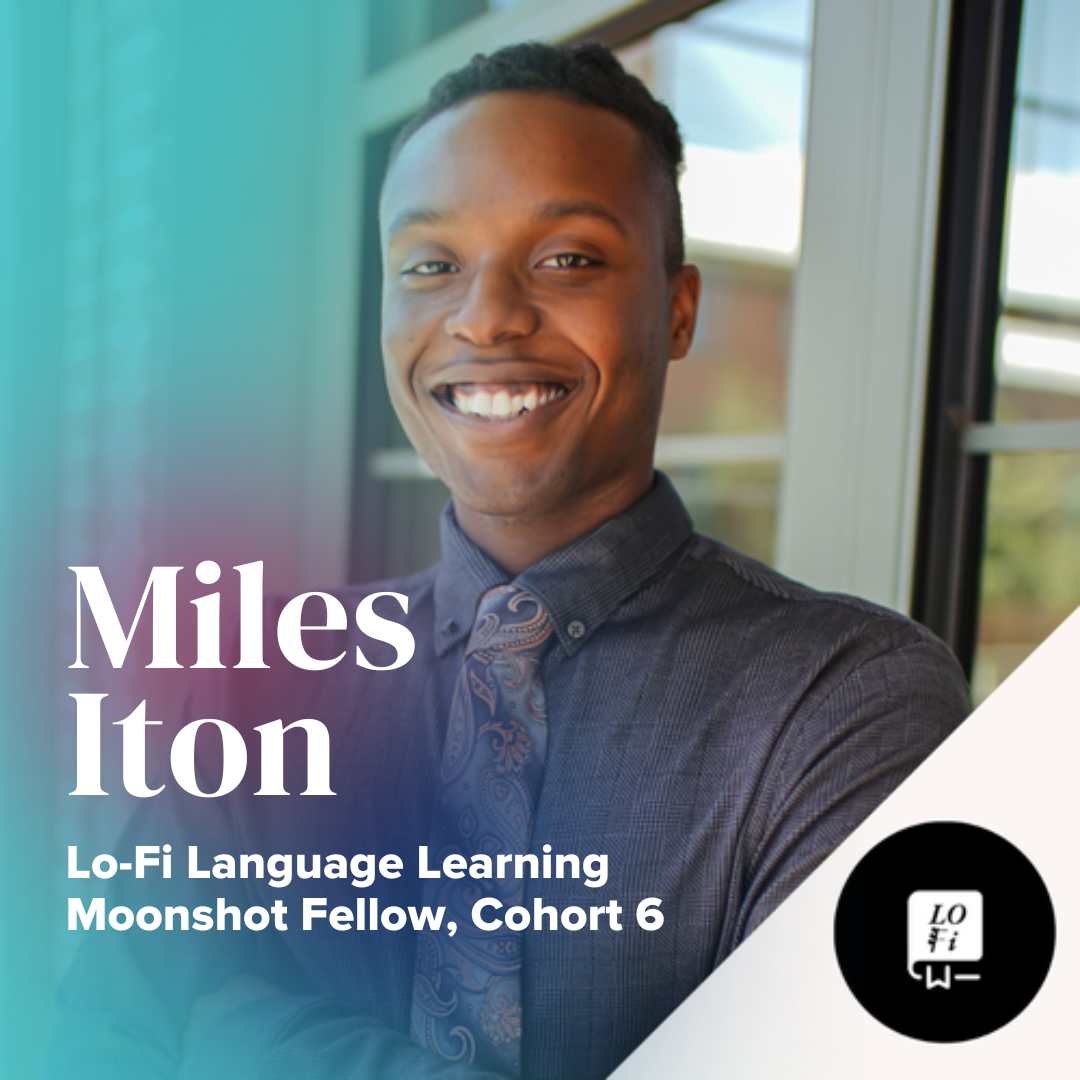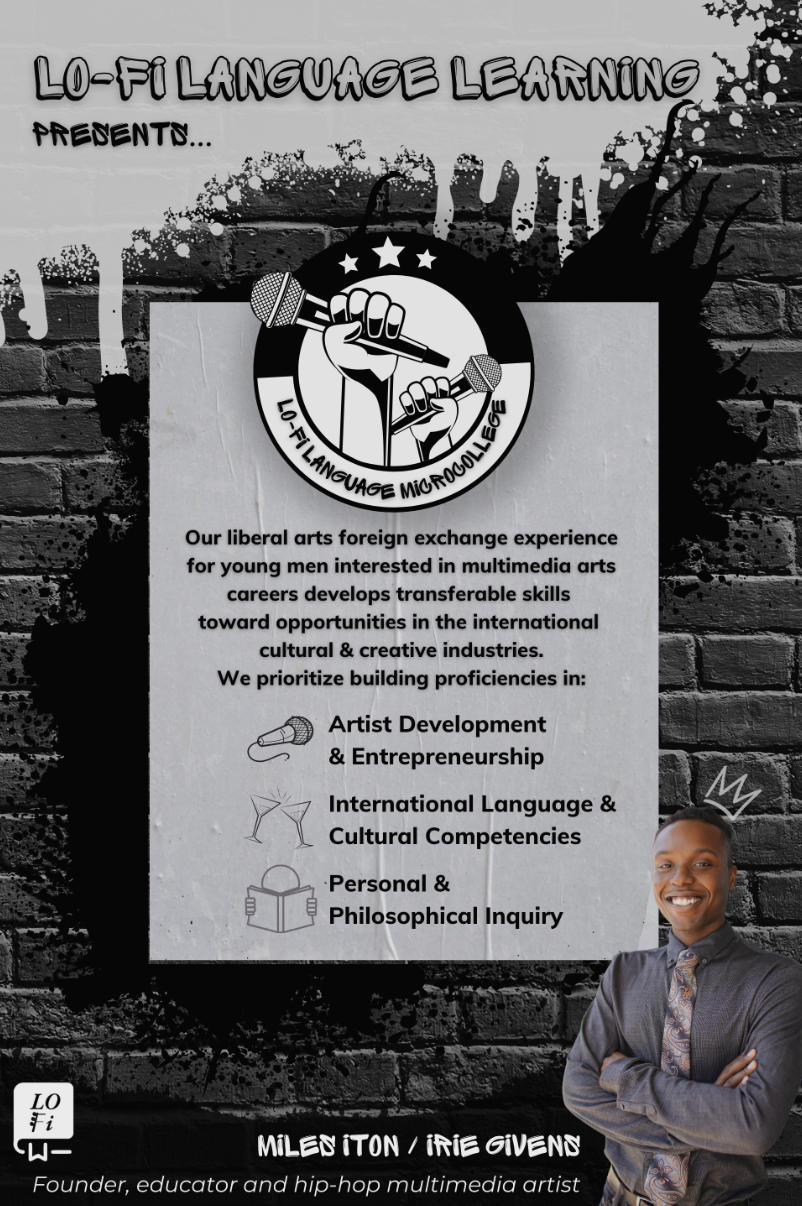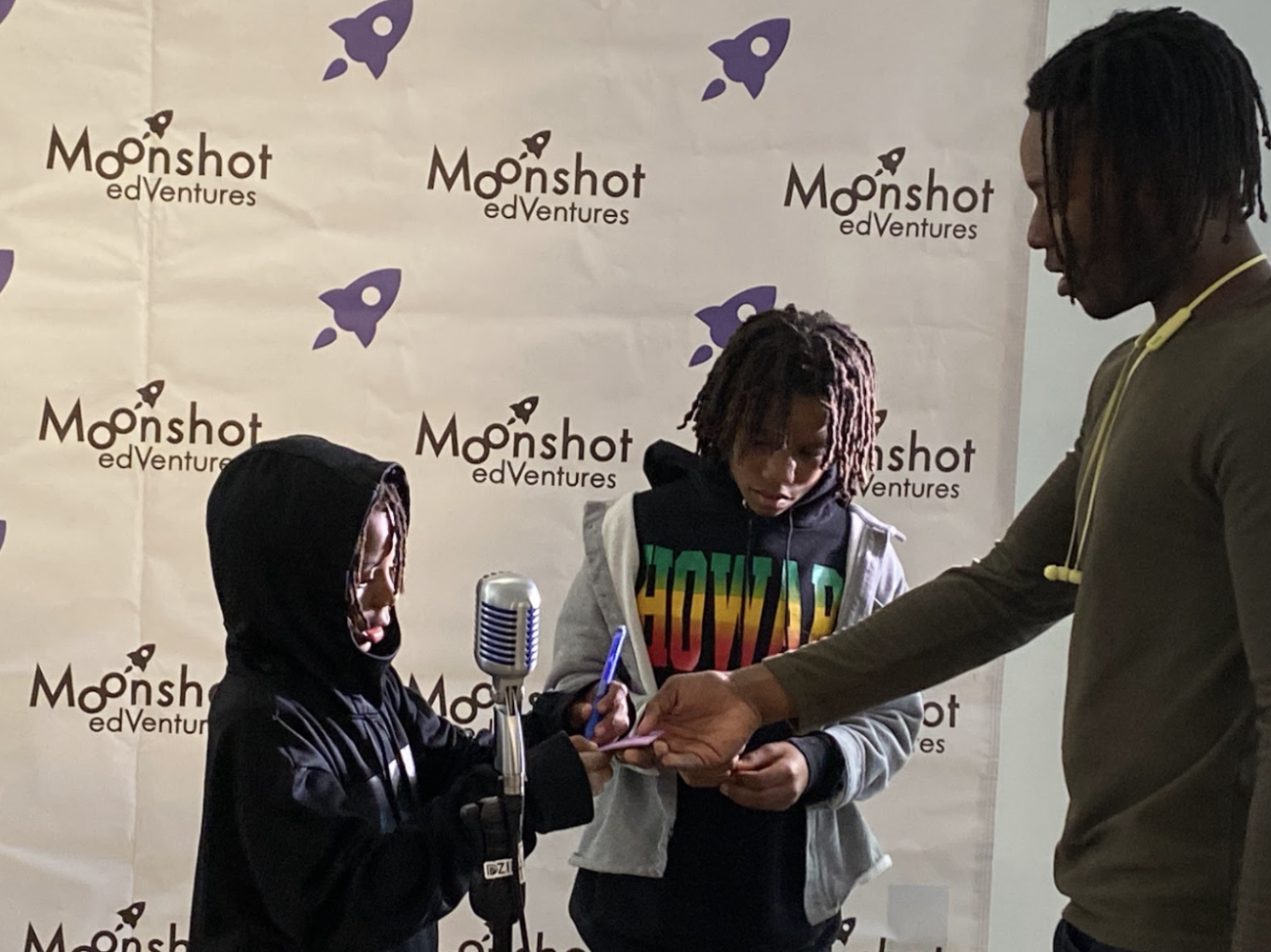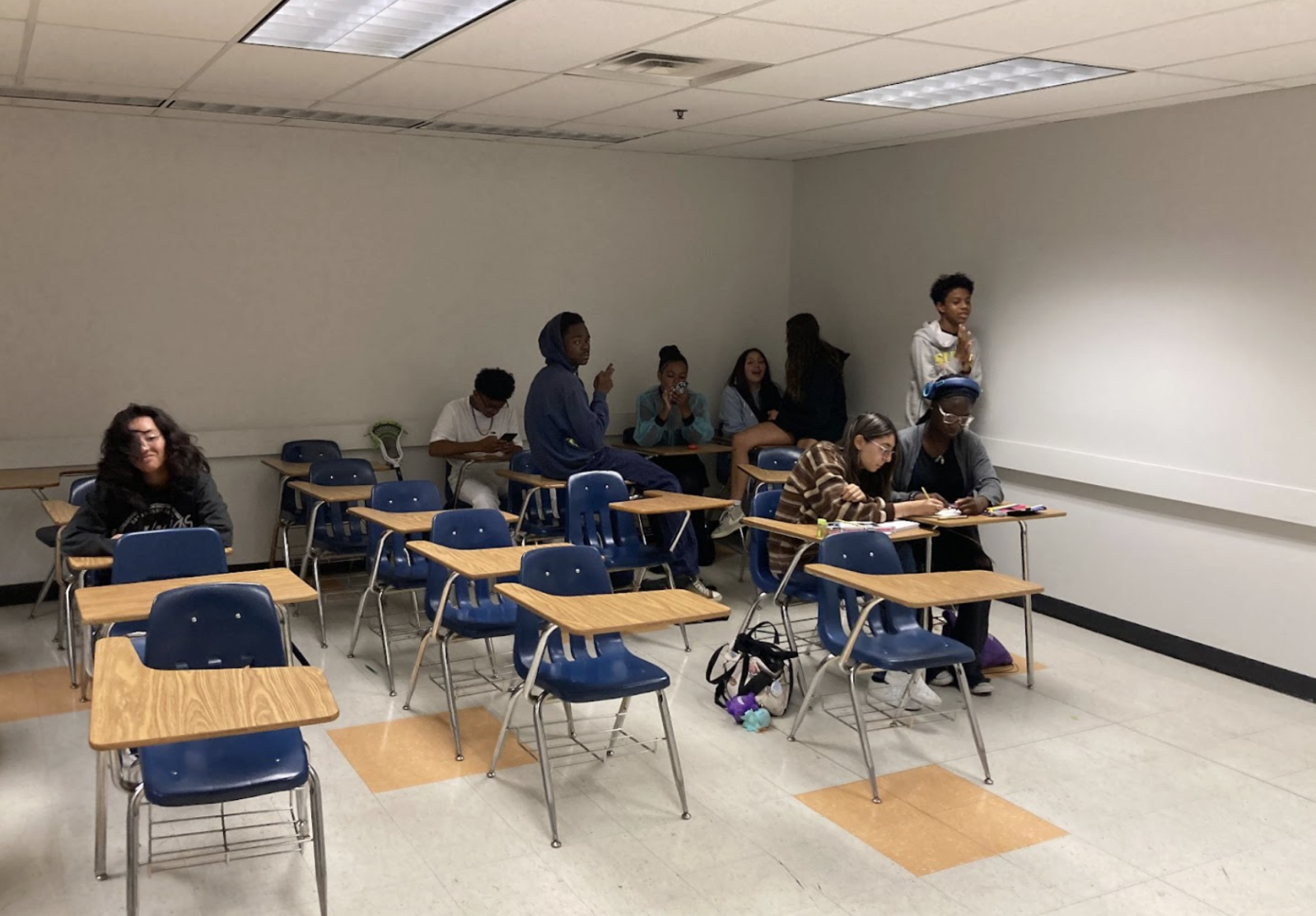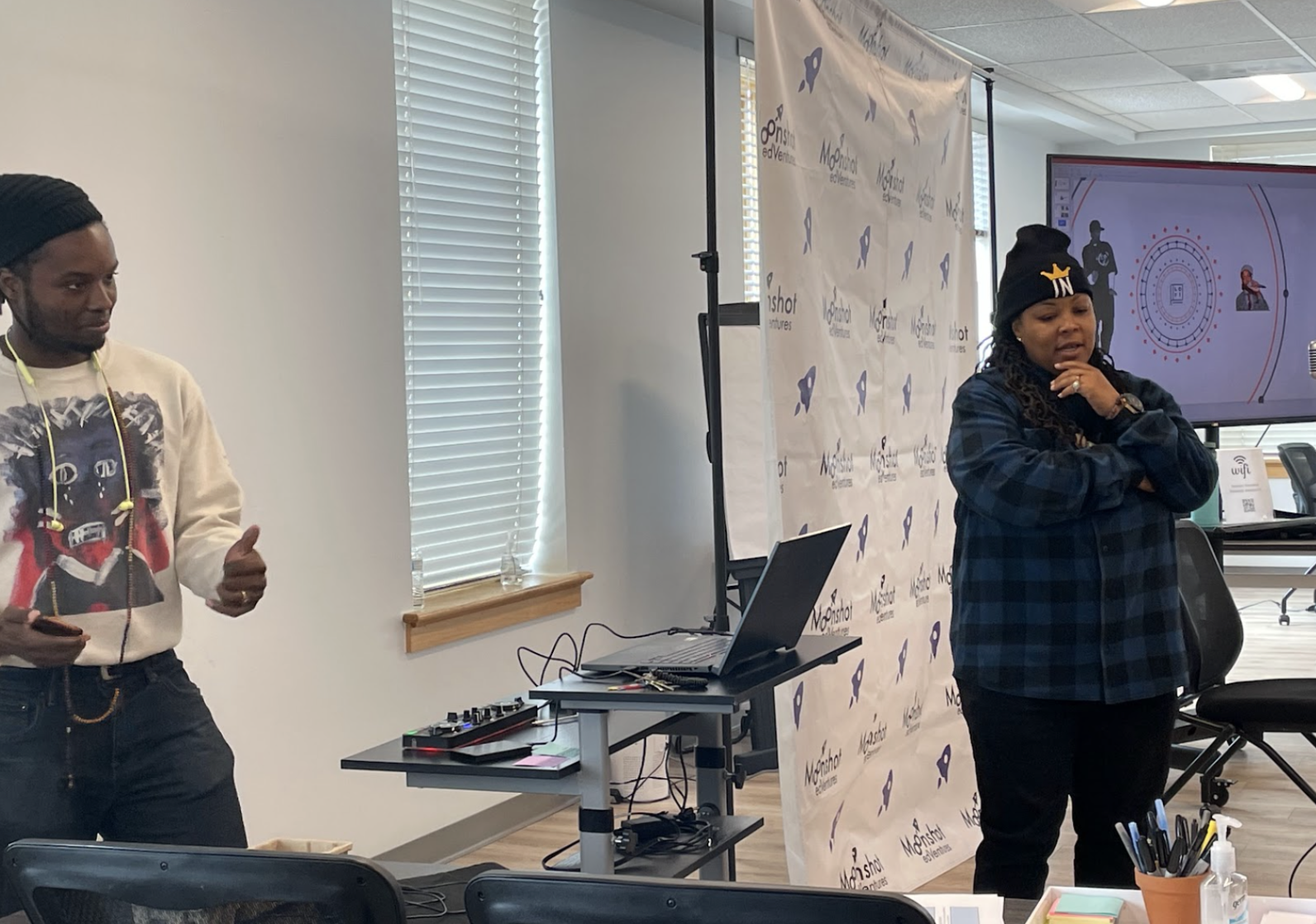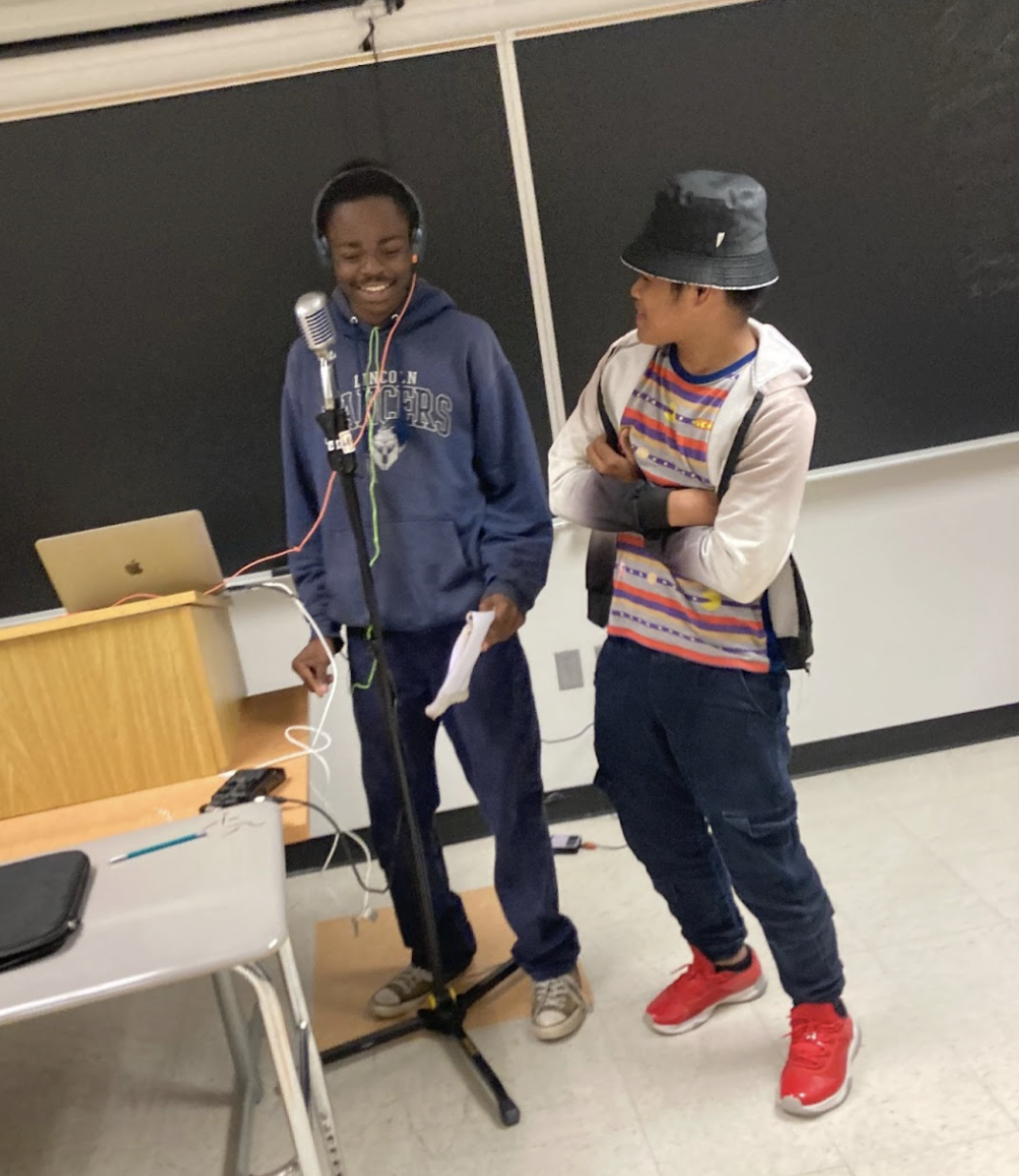Creating Study-Abroad Arts Opportunities for Young Men, Rooted in Hip-Hop Pedagogy
In our Fellowship Series, we feature stories and work from Moonshot Fellows. The Moonshot Fellowship allows individuals to explore designing and launching a new learning environment, such as a new school or program.
In the post below, Miles Iton (Moonshot Fellow, Cohort 6) reflects on his experience in the Cultivate and Prepare to Launch stages of the Fellowship. In these stages, Moonshot Fellows go through a “boot camp” of content in January focused on budgeting, recruitment, program evaluation, and people leadership, and they work on piloting their ideas via two rounds of full-day pilots with the community they aim to serve. Each Fellow has an opportunity to lead and manage other Fellows and plan the necessary logistics needed to execute one round of pilots. Through their Pilots, Fellows test their most risky assumptions for their venture model, try their hand at operations and people management, and engage students and families in the launch of their ventures.
Miles Iton, Founder of Lo-Fi Language Learning, Reflects on His Journey and Pilot with the Moonshot Fellowship
Lo-Fi Language Learning will make the benefits of a liberal arts education accessible to young men of our culture through a study-abroad microcollege rooted in hip-hop pedagogy.
Growing Up With a North Star of Hip-Hop
As a child, the school culture I was raised in often gave me the impression that progress in school and society implied I had to put my own culture as a Black American aside. The more I grew up, the more I realized there was a false dichotomy that was impressed upon me and a lot of other boys of color: that hip-hop and a “classical” higher education were mutually exclusive worlds.
Thankfully, I had a professor (shout out to Dr. Carl Shaw at New College of Florida) who allowed me to explore hip-hop in my studies and dive deeper into how it connected with his Classics research. Making an effort to become a better hip-hop artist was the north star for my journey to succeed in academia. It has empowered me to travel the world and learn transferable skills that have allowed me to work across multiple sectors.
Now that Hip-Hop Studies and Pedagogy have begun to permeate education industries across the globe, there is an opportunity to utilize the “strength of street knowledge” towards new possibilities for young male/masculine-of-center students to find their futures in higher education.
Freestyle Rap Tutorials: a Rare Artistic Safe Space for Male Students
I know the value of this work through my own journey in education, both as a student and as a teacher. At New College, I majored in Philosophy with the side hustle of performing as a hip-hop artist. I had been a Youth Minister trainee in my church growing up, and I brought that passion to education by teaching youth classes for writing and performance. Something clicked for me during one of those classes.
I ran a hip-hop composition workshop for other students that would soon grow into Lo-Fi. Too many of my male students shared with me that our “freestyle tutorials” were one of the few spaces they felt encouraged to explore their emotional and artistic growth in a school setting. That sentiment is reflected in the current enrollment/retention crisis of young men in American universities.
I knew as a college student that I wanted to make a change. I want there to be a path laid for the young men of our hip-hop generation that goes beyond getting the bag and towards being that legendary emcee who creates new cultural—and personal—pathways to coming-of-age for the generation that follows them.
Finding Moonshot and Embracing the Power of Community
I always felt that I had a “crash landing” in Colorado; I had moved in the middle of the pandemic. As a graduate student, I focused on studying the organizational management fundamentals necessary to run my own educational venture, but after moving to Colorado, I had put my venture on ice to figure out how to sustain myself in a completely new environment at the time.
My Moonshot Fellowship experience encouraged me to rebuild the rocket from scratch and find my way back to doing what it is I loved to do. For example, it was much easier to convince me to go to a local hip-hop show and meet the talent when it became about connecting with the community of my target audience rather than needing to be seen or promote myself as an artist in a brand-new environment. Moonshot inspired and empowered me to take the leap… I’ve recently left my full-time role in education marketing to coalesce all these skills into the toolbox that can build Lo-Fi into a full-time occupation.
My biggest takeaway from the Moonshot experience thus far would have to be embracing the transformative power of community when it comes to building your own thing. As an artist, it’s easy to fall into the DIY mindset of grinding away on your own in the lab and only presenting your work when it’s ready for consumption. I felt so empowered by the Moonshot team, my C6 cohort, and even cohorts before ours to reach out and ask for the help I needed - it takes an eye, an ear, and a hand altogether to make a body of work!
Connecting With Young Colorado Students for the Lo-Fi Language Pilots
THE VISION
In all of my piloting activities with Moonshot, I aimed to bridge the gap between what we currently understand as Hip-Hop Pedagogy and those ground-level hard and soft skills needed to pursue the career of one’s dreams.
MAKING MUSIC
I ran two pilots in the Cultivate stage, where I invited hip-hop artists in the community to an impromptu career brainstorming and music video recording session. I flipped the Moonshot office into a recording space as we brainstormed and performed all afternoon.
When it came time for my Prepare to Launch pilot a few months later, I was eager to find out whether or not we could keep that spirit of raw creative development within the context of a more traditional school structure. We met twice a week at Metropolitan State University of Denver in the middle of their Upward Bound programming as part of their “music” class block for about an hour and a half. Our classroom space was as traditional as can be: rows of desks, a green chalkboard, an admittedly dated projector setup, and an awkward piano in the front of the room.
I wanted to introduce nontraditional students to the idea of what a formal, “collegiate” pathway to work in a media or performance industry could look like. In that pilot, we participated in classroom activities, guest lectures, and workshopping sessions all the way to a final writing or performance project that prompted them to “tell their own story” (however they interpreted it).
“We like listening to you talk! You’re one of our favorite classes. At the bare minimum, [comparatively] you at least try not to get on our nerves…”
IN SYNC
I took the shout-out above from one of my students during Moonshot’s pilot visit as a W for the day, but it was as revelatory as it was complimentary. The group was just a year or two younger than my intended target audience for Lo-Fi but it gave me great insight into how students can be prepared to encounter such an opportunity within the context of the school system.
I learned the hard way throughout this process just how transparent the monotonous bad faith of “you need college to be successful” refrains seemed to my students—and justifiably so. It made me feel empowered to know that even if some students weren’t interested in higher education at all—hip-hop-based or otherwise—they took the opportunity to explore sharing these and other vulnerabilities through lyrics and performance.
After the pilots, I understood how important it is to meet your students where they are at—perhaps the biggest principle Moonshot was encouraging us to tap into in the first place! It can be easy for us as educators to create a curriculum that we think will be a revolutionary experience but then ironically put our students through the same experience of obligation they are getting from the traditional school/program mentality we want to supplant.
My pilot results ended a lot differently than the journey I initially charted on paper, but that should not be a bad thing. This only reaffirmed how much I truly believed in the former motto of my alma mater: each student [should be] responsible in the last analysis for [their] own education.
What’s Next & Getting Connected
I’m currently in Taiwan with my co-founder Donovan Brown as we are building towards the first pilot session of our micro college’s international component.
We’re aiming to bring systems-impacted youth from Hip Hop for Change’s Pipeline 2 Positivity program over to Taiwan for a week-long exploration of personal and artistic development in a brand-new environment. I am super excited to try what will be our first foray into internationalizing our program. Even more, I am excited to try and bring a new perspective to both the idea of a college experience and the young emcees we introduce it to.
Interested in learning more? Please visit our website at lofilanguage.com to learn more about our programming and sign up for our mailing list. We are also available via email at staff@lofilanguage.com and via social media at @lofilanguage on Instagram, @Lo-Fi Language Learning on Facebook & on LinkedIn.


